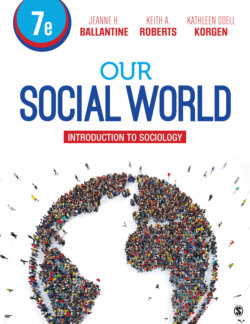Читать книгу Our Social World - Kathleen Odell Korgen - Страница 139
На сайте Литреса книга снята с продажи.
Structural-Functional Theory.
ОглавлениеStructural-functional theorists (also called functionalists) ask why members of an ethnic subculture or a society engage in certain practices. To answer, they look at how those practices contribute to the survival or social solidarity of the group or society as a whole. Consider the reverence for cattle in India. The sacred cow is protected, treated with respect, and not slaughtered for food. The reasons relate to India’s ancient development into an agricultural society that required sacrifices. Cattle were needed to pull plows and to provide a source of milk and dried dung for fuel. Cows gained religious significance because of their importance for the survival of early agricultural communities. They must, therefore, be protected from hungry people for the long-term survival of the group. Protecting cows was functional; that is, the practice served a purpose for society (Harris 1989).
Functionalists view societies as composed of interdependent parts, each fulfilling certain necessary functions or purposes for the total society (Radcliffe-Brown 1935). Shared norms, values, and beliefs, for instance, serve the function of holding a social group together. At a global macro level, functionalists see the world moving in the direction of having a common culture, potentially reducing we-versus-they thinking and promoting unity across boundaries. Synthesis of cultures and even the loss of some cultures are viewed as a natural result of globalization. But read on!
Although most cultural practices serve positive functions for the maintenance and stability of society, some practices, such as slavery and those using child labor, may be functional for those in power but dysfunctional for minority groups or individual members of society. The fact that some societies are weak or have died out suggests that their way of life may not have been functional in the long run. Consider the case of Haiti, a country weakened, in part, because all the forests have been cut down to provide firewood. The resulting erosion made much of the land unusable for growing crops and led to a scarcity of food (Diamond 2012; FAO 2016). Add to the existing poverty and hunger the devastation brought about by two earthquakes in 2010 that damaged or destroyed most buildings, followed by a hurricane and a cholera epidemic. The country and its people must rely on external support and donations from other countries to survive as it tries to rebuild.
The functionalist perspective has been criticized because it fails to consider how much dysfunction a society has, how much conflict a society can tolerate, and how much unity is necessary for a society to survive. Some critics argue that functional theory overemphasizes the need for consensus and integration among different parts of society, thus ignoring conflicts that may point to problems such as inequality in societies (Dahrendorf 1959).
